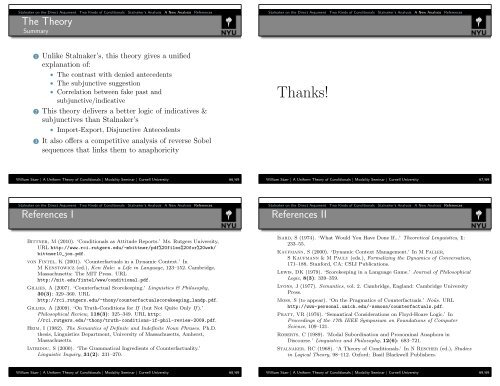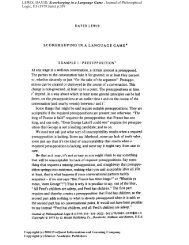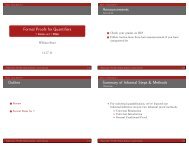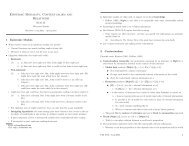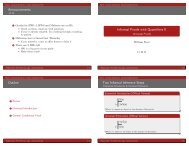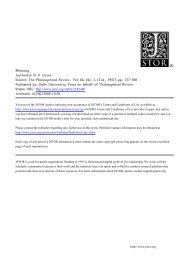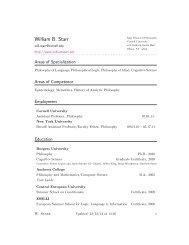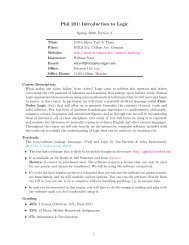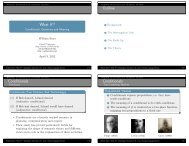A Uniform Theory of Conditionals: Beyond Stalnaker - Will Starr
A Uniform Theory of Conditionals: Beyond Stalnaker - Will Starr
A Uniform Theory of Conditionals: Beyond Stalnaker - Will Starr
You also want an ePaper? Increase the reach of your titles
YUMPU automatically turns print PDFs into web optimized ePapers that Google loves.
<strong>Stalnaker</strong> on the Direct Argument Two Kinds <strong>of</strong> <strong>Conditionals</strong> <strong>Stalnaker</strong>’s Analysis A New Analysis References<br />
The <strong>Theory</strong><br />
Summary<br />
<strong>Stalnaker</strong> on the Direct Argument Two Kinds <strong>of</strong> <strong>Conditionals</strong> <strong>Stalnaker</strong>’s Analysis A New Analysis References<br />
1 Unlike <strong>Stalnaker</strong>’s, this theory gives a unified<br />
explanation <strong>of</strong>:<br />
• The contrast with denied antecedents<br />
• The subjunctive suggestion<br />
• Correlation between fake past and<br />
subjunctive/indicative<br />
2 This theory delivers a better logic <strong>of</strong> indicatives &<br />
subjunctives than <strong>Stalnaker</strong>’s<br />
• Import-Export, Disjunctive Antecedents<br />
3 It also <strong>of</strong>fers a competitive analysis <strong>of</strong> reverse Sobel<br />
sequences that links them to anaphoricity<br />
Thanks!<br />
<strong>Will</strong>iam <strong>Starr</strong> | A <strong>Uniform</strong> <strong>Theory</strong> <strong>of</strong> <strong>Conditionals</strong> | Modality Seminar | Cornell University 66/69<br />
<strong>Will</strong>iam <strong>Starr</strong> | A <strong>Uniform</strong> <strong>Theory</strong> <strong>of</strong> <strong>Conditionals</strong> | Modality Seminar | Cornell University 67/69<br />
<strong>Stalnaker</strong> on the Direct Argument Two Kinds <strong>of</strong> <strong>Conditionals</strong> <strong>Stalnaker</strong>’s Analysis A New Analysis References<br />
References I<br />
<strong>Stalnaker</strong> on the Direct Argument Two Kinds <strong>of</strong> <strong>Conditionals</strong> <strong>Stalnaker</strong>’s Analysis A New Analysis References<br />
References II<br />
Bittner, M (2010). ‘<strong>Conditionals</strong> as Attitude Reports.’ Ms. Rutgers University,<br />
URL http://www.rci.rutgers.edu/~mbittner/pdf%20files%20for%20web/<br />
bittner10_jos.pdf.<br />
von Fintel, K (2001). ‘Counterfactuals in a Dynamic Context.’ In<br />
M Kenstowicz (ed.), Ken Hale: a Life in Language, 123–152. Cambridge,<br />
Massachusetts: The MIT Press. URL<br />
http://mit.edu/fintel/www/conditional.pdf.<br />
Gillies, A (2007). ‘Counterfactual Scorekeeping.’ Linguistics & Philosophy,<br />
30(3): 329–360. URL<br />
http://rci.rutgers.edu/~thony/counterfactualscorekeeping_landp.pdf.<br />
Gillies, A (2009). ‘On Truth-Conditions for If (but Not Quite Only If ).’<br />
Philosophical Review, 118(3): 325–349. URL http:<br />
//rci.rutgers.edu/~thony/truth-conditions-if-phil-review-2009.pdf.<br />
Heim, I (1982). The Semantics <strong>of</strong> Definite and Indefinite Noun Phrases. Ph.D.<br />
thesis, Linguistics Department, University <strong>of</strong> Massachusetts, Amherst,<br />
Massachusetts.<br />
Iatridou, S (2000). ‘The Grammatical Ingredients <strong>of</strong> Counterfactuality.’<br />
Linguistic Inquiry, 31(2): 231–270.<br />
Isard, S (1974). ‘What Would You Have Done If...’ Theoretical Linguistics, 1:<br />
233–55.<br />
Kaufmann, S (2000). ‘Dynamic Context Management.’ In M Faller,<br />
S Kaufmann & M Pauly (eds.), Formalizing the Dynamics <strong>of</strong> Conversation,<br />
171–188. Stanford, CA: CSLI Publications.<br />
Lewis, DK (1979). ‘Scorekeeping in a Language Game.’ Journal <strong>of</strong> Philosophical<br />
Logic, 8(3): 339–359.<br />
Lyons, J (1977). Semantics, vol. 2. Cambridge, England: Cambridge University<br />
Press.<br />
Moss, S (to appear). ‘On the Pragmatics <strong>of</strong> Counterfactuals.’ Noûs. URL<br />
http://www-personal.umich.edu/~ssmoss/counterfactuals.pdf.<br />
Pratt, VR (1976). ‘Semantical Considerations on Floyd-Hoare Logic.’ In<br />
Proceedings <strong>of</strong> the 17th IEEE Symposium on Foundations <strong>of</strong> Computer<br />
Science, 109–121.<br />
Roberts, C (1989). ‘Modal Subordination and Pronominal Anaphora in<br />
Discourse.’ Linguistics and Philosophy, 12(6): 683–721.<br />
<strong>Stalnaker</strong>, RC (1968). ‘A <strong>Theory</strong> <strong>of</strong> <strong>Conditionals</strong>.’ In N Rescher (ed.), Studies<br />
in Logical <strong>Theory</strong>, 98–112. Oxford: Basil Blackwell Publishers.<br />
<strong>Will</strong>iam <strong>Starr</strong> | A <strong>Uniform</strong> <strong>Theory</strong> <strong>of</strong> <strong>Conditionals</strong> | Modality Seminar | Cornell University 68/69<br />
<strong>Will</strong>iam <strong>Starr</strong> | A <strong>Uniform</strong> <strong>Theory</strong> <strong>of</strong> <strong>Conditionals</strong> | Modality Seminar | Cornell University 69/69


